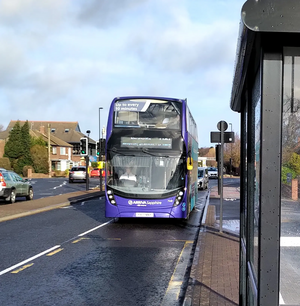Cleaner buses before clean air charging zones in Newcastle say Liberal Democrats

Newcastle's Liberal Democrats Opposition have called on Newcastle City Council to urgently investigate the feasibility of adopting Nottingham's approach to ensuring clean air by focusing on reducing diesel bus emissions on key bus corridors, rather than implementing controversial charging zone proposals.
Unlike Newcastle, Nottingham council secured agreement from Government on an alternative approach to improving air quality, which meant the need for road tolls was avoided in the East Midlands city. Newcastle's failure to come up with a credible alternative plan earlier this year led to the Government serving notice on the council that it would face prosecution for air quality breaches if it did not consider a clean air charging regime.
Nottingham's plan will see the council improving air quality by:
- retrofitting 171 buses with technology to reduce emissions, funded through the Govermment's Clean Bus Technology Fund
- changing the age and emissions policy for hackney carriages and supporting an increase in low emission taxis, using £1m of government funding to provide a licensing discount for drivers and a taxi rank with charging points
- conversion of the council's own vehicle fleet including replacing heavy, high polluting diesel vehicles such as bin lorries with electric vehicles
Nottingham has also adopted other measures including
- £15m investment in electric bus fleets
- investment in biogas and retrofitted buses
- expanding its tram network
- improving cycling facilities including via bike hubs and cycle hire schemes
- significant investment in cycle corridors
- introduction of a workplace parking levy to tackle congestion and traffic growth whilst generating funds to invest in public transport
Nottingham's proposals drew rapid support from Government who agreed to sign off the proposals without requiring the city to consider a charging zone approach, and Newcastle Liberal Democrats transport and air quality spokesperson Cllr Greg Stone believes Newcastle has missed a trick by not following a similar course.
He said : "We accept the environmental and public health impact of traffic congestion and emissions, particularly diesel emissions. However, we are also conscious of grave disquiet on the part of the public and business on the economic impact the council's road tolls proposals will have on the city.
The Liberal Democrats have already called for the money the council will have to spend on a road charging infrastructure for what may be only a few years to be redirected into long term public and sustainable transport initiatives. Our plans will focus on improving air quality on major bus corridors in the city centre and on arterial routes, including seeking to ensure a transition to low emission electric or gas powered buses, as adopted successfully in Brighton, and introduction of electric bus park and ride provision, as adopted successfully in York. We also advocate doing more to reduce school run traffic and increasing the areas of the city covered by air quality monitoring.
We think the council has made a serious failure by not investigating and adopting the approach followed by Nottingham, which the Government has been happy to support. Instead, the current leadership of the Council has done precious little on improving air quality in recent years, and chose to waste many months failing to come up with an alternative plan of its own, resulting in the Government ordering them to consult on clean air charging zones.
It is not too late for the council to rethink its approach. It is striking that the Government has agreed to Nottingham's proposals, which appear to be broadly similar to the proposals already set out by the Liberal Democrats in Newcastle. They have proved to be acceptable and workable elsewhere. Newcastle council could have taken the £12.50 a day charge off the table by now if they had shown similar foresight. A Liberal Democrats administration will apply the lessons from Nottingham and other cities to Newcastle so that we can enjoy cleaner air through better public transport, not punitive daily charges."
